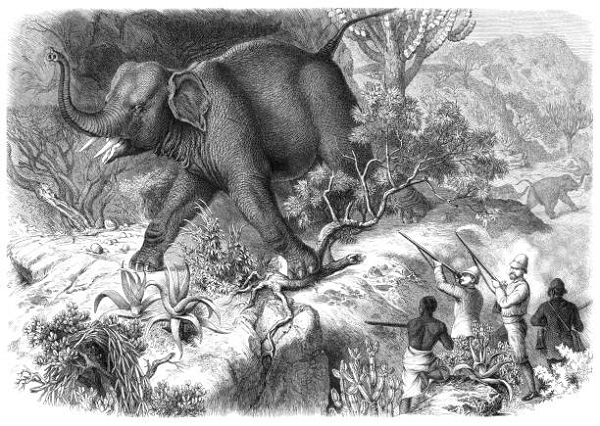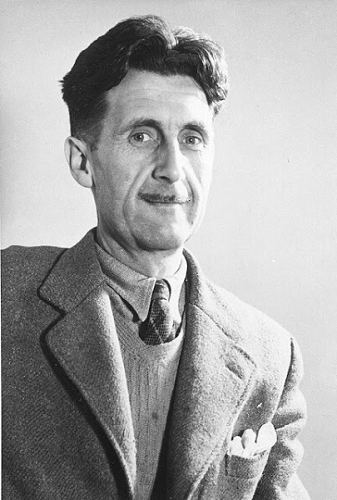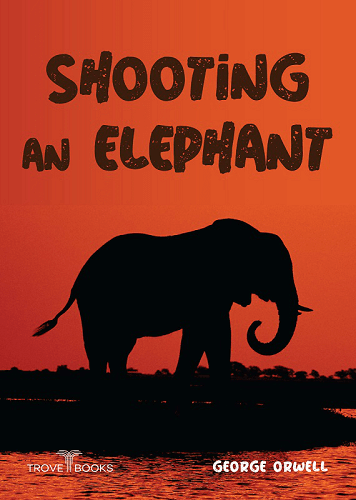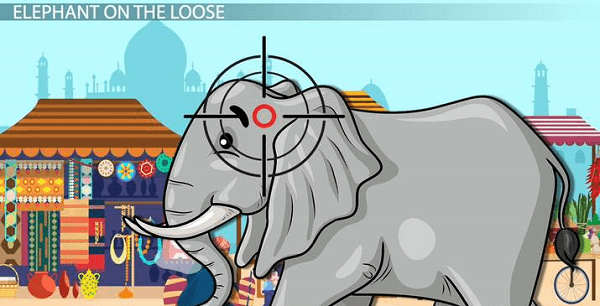Shooting the Elephant SummaryIntroductionThe short story titled "Shooting the Elephant" tackles the depiction of a hypothetical meeting between a British colonial police officer in Burma and an Englishman. A deterministic, uncontrollable elephant encounter is described in the tale. The narrator makes it clear that while he didn't want to shoot the elephant, the servile Burmese population forced him to do so to bring about their collective redemption. 
The study provides a breakdown of colonial nations as the individuals in the colonized areas use them. The officer expresses the sarcasm directed at the authorities while describing his breakdown. The narration of the shooting itself and the depiction of the elephant's protracted, agonizing death-which appeared to be calm in the hands of a colonial officer-capture the horrific realities of colonialism. The aforementioned essay argues that George Orwell's fable "Shooting an Elephant" is a metaphor for imperialism. About the AuthorThe famed British novelist George Orwell is widely known for his novels Animal Farm (1945) and Nineteen Eighty-Four (1949), among other well-known works. He was a novelist, journalist, essayist, and critic, and his essay "Shooting an Elephant" was first heard on the BBC Home Service on October 12, 1948. Later it was printed in the literary magazine New Writing in late 1936. Additionally, he wrote The Road to Wigan Pier which was published in 1937. He referred to his family as being located between the lower middle and upper middle classes, lacking financial means. He was born in 1903 in Motihari, Bengal, India to this family group. 
ThemeThe Evils of ImperialismThe tale exposes the nefarious aspects of imperialism, such as the filthy labor done by abandoned prisoners and bamboo beatings. Because of his role in continuing to treat the Burmans poorly, the narrator is tormented with remorse. The narrative also emphasizes the vicious cycle of resentment that results from living under the oppression of a tyrannical government: the more a population rebels and mistreats the occupying troops, the more the latter grow indignant and the punishments become worse. As a result, both the population and the occupiers become increasingly resentful. The Burmans are a helpless, poor, and oppressed people who are entirely dependent on the British administration. Even though the narrator is a member of the imperial machine, he despises it since he can see its drawbacks and victims. The Conscience CrisisThe slaughter of the elephant causes the narrator to wrestle with his morality. After shooting the elephant, he realizes he didn't do it right, and the animal's pain finally forces him to back down. He learns later that the elephant took a half-hour to pass away, and he is tormented by remorse for many years as a result of knowing that he made the wrong choice for the wrong reasons. The Struggle with PrideThe narrator battles with his conscience since he doesn't want to appear foolish in front of the Burman throng by ignoring the elephant. Even worse, he doesn't want the elephant to unintentionally kill him; it would make the crowd laugh. The difficulty he is in, he observes, is a result of the "futility of the white man's dominion in the East." He believes that despite the fact that his position should give him authority, he actually has very little control over anything and views himself as a puppet whose strings are being tugged by the audience. SummaryIn a town in the British colony of Burma, George Orwell holds the position of the subdivisional police officer. The majority of the Hamlet despises him since he is an occupier of the military. Even though the Burmese never put on a full-scale uprising, they constantly make fun of Orwell to show how disgusted they are. Orwell experiences two opposing reactions to this scenario. On the other hand, he feels resentment for the institutionalized mistreatment of its citizens by the British Empire because of his position. He detests the locals, though, because of the jeers they direct at him. The British Raj is described by Orwell as a "unbreakable tyranny," yet he is also divided between calling the death of an annoying peasant the "greatest joy in the world" and doing so. 
One day, an event demonstrates to Orwell "the real nature of imperialism." A tamed elephant has broken free of its restraints and gone mad, endangering the lives of locals and their possessions. The "mahout" of the elephant, the only person who is able to manage it, traveled in the wrong direction while seeking for it and is now twelve hours away. Orwell travels to the area where the elephant was last seen. Residents of the area provide such varying accounts that Orwell is on the verge of concluding that the entire incident was a fabrication. His attention is suddenly drawn to a nearby commotion. When he rounds a corner, he discovers a laborer-a "coolie"-lying dead in the dirt, having been crushed and skinned alive by the renegade elephant. Having a gun powerful enough to shoot an elephant is what Orwell instructs a subordinate to bring him. Locals indicate that the elephant is in a neighboring field when Orwell's subordinate arrives with the rifle. A sizable number of neighbors follow Orwell as he makes his way to the field. The residents of the town have seen the gun and are anticipating seeing the elephant shot. Orwell is uncomfortably aware that he did not intend to shoot the elephant. When they arrive, they find the elephant in the field munching on grass without being bothered. After realizing that doing so would be like destroying costly infrastructure, Orwell decides not to shoot the calm animal. Shooting an adult elephant is also cruel. Upon realizing this, Orwell turns to face the thousands-strong mob that has gathered, and he observes that they are expecting him to shoot the elephant as though it were a staged play. Orwell understands that the freedom of white males is the genuine price of white Westerners' conquest of the Orient. As "puppets," the colonizers are obligated to meet the demands of their people. Because he finds it insufferable, Orwell must shoot the elephant to avoid being teased by the locals. Orwell concludes that approaching the elephant and observing its reaction would be the best line of action, but doing so would be risky and may expose Orwell to humiliation in front of the people. Orwell must slay the beast in order to prevent this unacceptably embarrassing situation. He points the rifle at what he believes to be the elephant's brain. The moment Orwell fires, the audience explodes in joy. The elephant squats down and starts to drool. The elephant's look deteriorates after another shot from Orwell, yet it does not fall over. A third shot causes the elephant to trumpet before falling to the ground and shaking the area where it lands. 
The downed elephant is still breathing. Orwell continues to shoot, but nothing happens. The elephant is clearly in pain. Orwell uses a smaller gun to shoot additional rounds into the elephant's throat because he is upset about the elephant being "powerless to move and yet powerless to die." Orwell flees the scene when this has no effect since he cannot bear to see the beast suffer. Later on, he learns that the elephant took 30 minutes to pass away. Shortly after, villagers separate the flesh from the animal's bones. It was debatable whether Orwell made the right decision in killing the elephant. The owner of the elephant was furious, but because he was Indian, he had no legal options. Older British people supported Orwell's decision, but younger colonists-who value elephants more than coolies-thought it was wrong to slaughter an elephant only because it had murdered a coolie. Orwell says he is fortunate that the elephant killed a man since it provided him with the legal basis for his own acts. Finally, Orwell questions whether any of his companions comprehended that he killed the elephant "solely to avoid looking a fool." AnalysisThe account of killing the elephant starts with a somber explanation of the events in which the narrator, George Orwell, recounts the challenges of working as a colonial police officer, particularly in British Burma in the middle of the 20th century, where many people despised him. Orwell demonstrates how nasty the anti-Europeans were to the point where they spat on the European women as they entered the market. Now that the Burmese were able to shout with disgusting laughter, the sub divisional police officials would become more alarmed. Orwell acknowledged that he would be content if he could rush past his captors, but he understood the anger and considered to be justifiable. According to Johnston (375), the incident involving the elephant-shooting starts with a phone call that Orwell got informing him that an elephant was destroying the market. He followed the elephant to the village where the Buddhist monks were quite enraged, numerous, and standing about the streets idly jeering at the Europeans. He was a police officer and had his hunting rifle with him. "Shooting an elephant" by George Orwell, as demonstrated by Runciman (182-183), exhibits the author as a socially concerned person. In addition, he claims that during the Burmese era, the book was a supplement. In both India and Burma, two nations that were a part of the British Empire, Orwell describes his experiences as a colonial official (Runciman 82-183). In this research, a colonial officer is forced to shoot a runaway elephant by a large group of native inhabitants in order to avoid looking cowardly in front of the large group of people. Orwell explains what happened after the elephant was shot and contrasts it with the animosity that existed between the British Empire and the officials as well as the indigenous. The shooting reflects a great deal of economic hardship since both sides in this circumstance harbor great levels of animosity, distrust, anger, and degradation of one another (Runciman 82-183). ConclusionIn "Shooting the Elephant," George Orwell depicts the moral dilemma this provides as well as how the imperialist nations oppress their respective populations. The narrator, who is induced to adopt the identity of a powerful white male, is motivated by what he believes the general public anticipates of him. This story shows the detrimental repercussions of colonial politics and imperialism and how, in the end, both the colonizers and the colonized are devastated. In the narrative, Orwell represents an anti-imperialist point of view; he despises colonial Britain's rule and demonstrates that the conqueror isn't always in command.
Next TopicSonnet 116 Summary
|
 For Videos Join Our Youtube Channel: Join Now
For Videos Join Our Youtube Channel: Join Now
Feedback
- Send your Feedback to [email protected]
Help Others, Please Share









